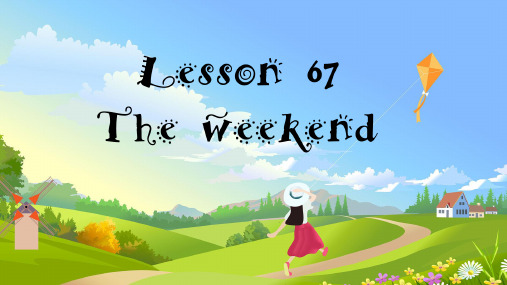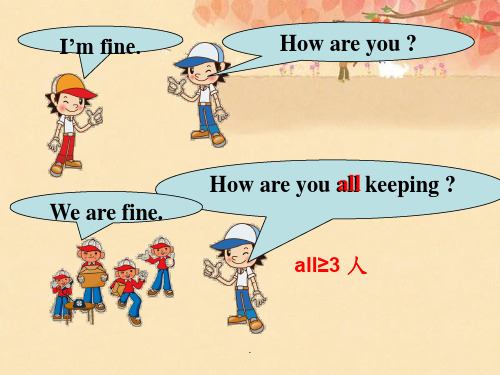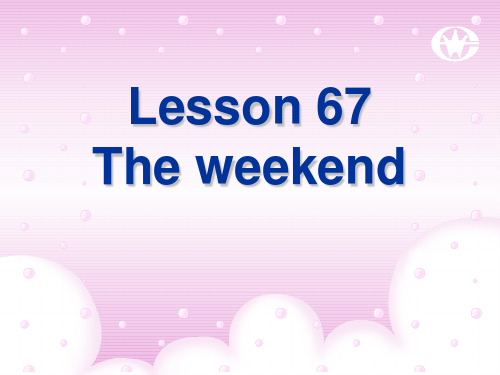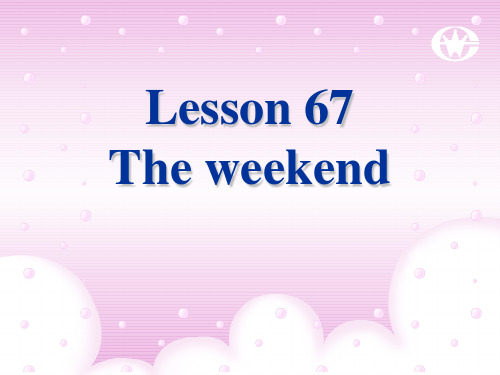新概念第一册67-68课课件
合集下载
新概念一L67-68ppt

from school today. 5.Thursday is between W_e_d_n_e_s_d_a_yand Friday.
7
8
二、Text
9
请欣赏音图动漫!(twice)
1. How’s Jimmy today? Key: He’s very well.
2. What are the Johnsons going to do
too
Were you at the butcher’s,
?
MRS. JOHNSON: NHoo,w’I swasn’t. I was at the
greengrocer’s.
Jimmy today? well
MRS. WILLIAMS: He’s veraybsent from , thank you.
Sam: No, 1__I___w_a_s_n_’___t
Nick: Where were you? Sam: I was in the office. Nick: Were you absent last week?
Sam: Yes, 2___I__w_a_s____ Nick: How 3__w_e_r_e__y__o_u_?
Thu,rsday
Wednesday and
.
How are you all keeping?
MRS. JOHNSON: Very well, thadnakysyou. country We are going to spend thrmeoether’s in weekend
the
F.riday
We arceougnotirnyg to stay at my
the
.
7
8
二、Text
9
请欣赏音图动漫!(twice)
1. How’s Jimmy today? Key: He’s very well.
2. What are the Johnsons going to do
too
Were you at the butcher’s,
?
MRS. JOHNSON: NHoo,w’I swasn’t. I was at the
greengrocer’s.
Jimmy today? well
MRS. WILLIAMS: He’s veraybsent from , thank you.
Sam: No, 1__I___w_a_s_n_’___t
Nick: Where were you? Sam: I was in the office. Nick: Were you absent last week?
Sam: Yes, 2___I__w_a_s____ Nick: How 3__w_e_r_e__y__o_u_?
Thu,rsday
Wednesday and
.
How are you all keeping?
MRS. JOHNSON: Very well, thadnakysyou. country We are going to spend thrmeoether’s in weekend
the
F.riday
We arceougnotirnyg to stay at my
the
.
Lesson67-68(课件)新概念英语第一册

1. 一般现在时 经常的状态 主语 + is/am/are +非动词 习惯的动作 主语 + 动词(原型/三单) 真理
一般过去时 过去经常的状态 主语 + was(is/am)/were +非动词 过去习惯的动作 主语 + 动词过去式
2. How’s Jimmy today? ’s = is/was/has
/
Where were you on...? (Sunday, January 1st) ...你在什么地方? I was at..., on...
When were you at ...? 你什么时候在......? I was at....,on...
书面练习B Examples: he/church/Sunday When was he at church? He was at church on Sunday.
6. weekend /'wi:kend/ n. 周末 week + end
7. country /kʌntri/ n. 乡村 - countries in the country in the city 在城里 in the village 在村里 in the town 在城镇
8. lucky /'lʌki/ adj. 幸运的 luck n. 运气 不可数 Good luck! 祝好运! You are so lucky! You are a lucky dog! 幸运儿
新概念Lesson 67&68
By Gaby
课文笔记复习+作业讲解:
1. greengrocer /'gri:n'grəusə/ n. 蔬菜水果零售商 at the greengrocer’s (shop) 在蔬菜水果零售店 at the butcher’s (shop) 在肉店 at the hairdresser’s (shop) 在理发店 at the stationer’s (shop) 在文具店 at the doctor’s (office) 在诊所 at my father’s (house) 在我父亲家
Lesson 67-68 The weekend(课件)-新概念英语第一册

如: last... 上一个...... ...ago ......之前 just now 刚刚 yesterday 昨天, the day before yesterday 前天
be动词的过去式
主语/时态 第一人称单数(I) 第三人称单数 (He, She, It)
现在时 am is
过去时 was
at the greengrocer’s
baker
/ˈbeɪkə/ n.
at the baker’s
at the greengrocer's (shop) at the grocer's at the hairdresser's
在蔬菜水果店 在杂货店 在理发店
at the doctor's (office) at my mother's (house)
Tuesday Friday weekend country baker grocer
Wednesday Saturday spend church keep greengrocer
Which one is appearing?
Saturday
absent country
weekend
greengrocer
Where were you on March 3rd? I was at...
Where were you on April 4th? I was...
Where were you on May 5th? I ...
Where was she on June 6th? She was at...
Friday /ˈfraɪdeɪ/
Saturday /ˈsætədeɪ/ Sunday /ˈsʌndeɪ/ weekend /ˌwiːkˈend/
be动词的过去式
主语/时态 第一人称单数(I) 第三人称单数 (He, She, It)
现在时 am is
过去时 was
at the greengrocer’s
baker
/ˈbeɪkə/ n.
at the baker’s
at the greengrocer's (shop) at the grocer's at the hairdresser's
在蔬菜水果店 在杂货店 在理发店
at the doctor's (office) at my mother's (house)
Tuesday Friday weekend country baker grocer
Wednesday Saturday spend church keep greengrocer
Which one is appearing?
Saturday
absent country
weekend
greengrocer
Where were you on March 3rd? I was at...
Where were you on April 4th? I was...
Where were you on May 5th? I ...
Where was she on June 6th? She was at...
Friday /ˈfraɪdeɪ/
Saturday /ˈsætədeɪ/ Sunday /ˈsʌndeɪ/ weekend /ˌwiːkˈend/
新概念一L67-68ppt课件

week?
.
MRS. WILLIAMS: Yes, he was. He was absent on Monday, Tuesday, Wednesday and Thursday. How are you all keeping ?
MRS. JOHNSON: Very well, thank you. We are going to spend three days in the country. We are going to stay at my mother’s for the weekend. MRS. WILLIAMS: Friday, Saturday and Sunday in the country! Aren’t you lucky!
at the grocer’s .
随堂补充资料
1. Monday is after S_u_n_d_a_y____. 2. The ba_k_e_r____ can make nice bread. 3. I’m going to s_pe_n_d____ two days in French. 4. Jill has a temperature. She is a_b_s_e_n_t_ from
.
名词篇
MRS. JOHNSON: Hello. Were you at the butcher’s? MRS. WILLIAMS: Yes, I was.
Were you at the butcher’s, too? MRS. JOHNSON: No, I wasn’t. I was at the
.
综合篇
MRS. JOHNSON: Hello.Were you at thebutcher’s? MRS. WILLIAMS: Yes, I was.
.
MRS. WILLIAMS: Yes, he was. He was absent on Monday, Tuesday, Wednesday and Thursday. How are you all keeping ?
MRS. JOHNSON: Very well, thank you. We are going to spend three days in the country. We are going to stay at my mother’s for the weekend. MRS. WILLIAMS: Friday, Saturday and Sunday in the country! Aren’t you lucky!
at the grocer’s .
随堂补充资料
1. Monday is after S_u_n_d_a_y____. 2. The ba_k_e_r____ can make nice bread. 3. I’m going to s_pe_n_d____ two days in French. 4. Jill has a temperature. She is a_b_s_e_n_t_ from
.
名词篇
MRS. JOHNSON: Hello. Were you at the butcher’s? MRS. WILLIAMS: Yes, I was.
Were you at the butcher’s, too? MRS. JOHNSON: No, I wasn’t. I was at the
.
综合篇
MRS. JOHNSON: Hello.Were you at thebutcher’s? MRS. WILLIAMS: Yes, I was.
新概念英语第一册第67-68课课件(共41张PPT)

in the country!
Aren't you lucky! ✲ 这句话是否定疑问句形式的感叹句,为的是加强语气。 尽管形式上是否定的,但却表示强有力的肯定。
Grammar
语法
一般过去时(simple past tense) :
过去发生的而现在已经结束的动作要用一般过去时。
基本用法:
1、常用来表示过去某一时间所发生的非持续性动作;
Lesson 67 The weekend
Discussion
What did you do on weekend ?
New Words
greengrocer 蔬菜水果零售商
absent
缺席的
keep
处于、保持
spend
度过
weekend 周末
country
乡村、国家
lucky
幸运的
New Words
5、We played(play的过去式) computer games together. 我们在一起玩了电脑游戏。
6、It ran(run的过去式) after a cat yesterday. 它昨天跑着追赶一只猫。
7、They made(make的过去式) a bookcase for Jim. 他们为Jim做了一个书架。
⑥Miss Zhang was ill 2 days ago. 张小姐前两天病了。
Miss Zhang wasn’t ill 2 days ago. 张小姐前两天没有生病。
一般过去时的句型构成形式:
一、含有系动词(be动词——am/is/are)的一般过去时形式:
✿疑问句: Was /Were + 主语 + …?
Aren't you lucky! ✲ 这句话是否定疑问句形式的感叹句,为的是加强语气。 尽管形式上是否定的,但却表示强有力的肯定。
Grammar
语法
一般过去时(simple past tense) :
过去发生的而现在已经结束的动作要用一般过去时。
基本用法:
1、常用来表示过去某一时间所发生的非持续性动作;
Lesson 67 The weekend
Discussion
What did you do on weekend ?
New Words
greengrocer 蔬菜水果零售商
absent
缺席的
keep
处于、保持
spend
度过
weekend 周末
country
乡村、国家
lucky
幸运的
New Words
5、We played(play的过去式) computer games together. 我们在一起玩了电脑游戏。
6、It ran(run的过去式) after a cat yesterday. 它昨天跑着追赶一只猫。
7、They made(make的过去式) a bookcase for Jim. 他们为Jim做了一个书架。
⑥Miss Zhang was ill 2 days ago. 张小姐前两天病了。
Miss Zhang wasn’t ill 2 days ago. 张小姐前两天没有生病。
一般过去时的句型构成形式:
一、含有系动词(be动词——am/is/are)的一般过去时形式:
✿疑问句: Was /Were + 主语 + …?
新概念英语第一册第67-68课课件

be动词的过去式
主语/时态 第一人称单数 ( I) 第三人称单数 (He, She, It) 第二人称单,复数 (You)第一人称、第三人 称复数we/they 现在时 am was is are were 过去时
is------isn’t
am-------am
not are-------aren’t
= How are you ? 用介词on。 keep v. (身体健康)处于(状况)
♣ MRS.JOHNSON:Very well, thank you. We're going to spend
three daysin the country. We're going to stay at my mother's for the weekend. stay: 短暂的居住。 for the weekend: 整个周末这几天 的时间。 at the weekend 强调时间的某一点
✲ well是形容词,表示身体好
♣ MRS.JOHNSON: Was he absent from school last week? last:上一个 week:周 last week:上周
★ MRS.WILLIAMS: Yes, he was. He was absent on Monday, Tuesday, Wednesday and Tuesday. on:表示在星期几 How are you all keeping?
find out: 有了什么,什么有变化 yesterday am----->was is------->was are------>were
一般过去时
定义:表示过去某个时间发生的动作或者存在
新概念一L67-68The weekend课件

I walked to school yesterday. He walked to school yesterday.
单数was,复数were
过去式 无人称、数的变化
句型转换
肯定句变否定句:
肯定句变一般疑问句:
I was in the office last night.
I was in the office last night.
ten to ten
o’clock
to 超过30分
half past
past 不超过30分
what’s the time?
five past seven
fifteen to nine a quarter to nine
five to ten
what’s the time?
P135 写出图上的时间
I was not in the office last night.
Were you in the office last night?
They were in the office just now.
They were in the office just now.
They were not in the office just now. Were they in the office just now?
['mʌndɪ] ['tju:zdɪ]
['wenzdɪ] ['θɜ:zdɪ] ['fraɪdɪ] ['sætədɪ] ['sʌndɪ] ['wi:kend]
n.星期一 n.星期二 n.星期三 n.星期四 n.星期五 n.星期六 n.星期日 n.周末
新概念英语第一册Lesson 67&68课件

Sunday, January 1st Where was she on…? When was she at church?
at the baker’s
Friday, June 6th Where was she on…? When was she at the baker’s?
Pari work:Ask and answer!
When was Jimmy absent from shcool? He was absent from school on Monday, Tuesday,Wednesday and Thursday. How many days are the Johnsons going to say in the country? They are going to stay there for three days.
现在已经结束的动作。本课学习了带有be动词的一 般过去时。本时态常和有明确表示过去的时间连用。
1.肯定句结构:主语+was/were+...,第一, 第三人称的过去时(am/is)要变为was。 其余的都用were。 was/were 2. 一般疑问句:________提前,其余不 变。 肯定回答:Yes,主语+was/were. 否定回答:No, 主语+wasn't/weren't. not was/were 3.否定句在_________后加______,其余 不变。
Can you retell it?
Homework!
1. Retell the dialogue. 2. Finish the related exercise. 3. Learn the new words by heart.
- 1、下载文档前请自行甄别文档内容的完整性,平台不提供额外的编辑、内容补充、找答案等附加服务。
- 2、"仅部分预览"的文档,不可在线预览部分如存在完整性等问题,可反馈申请退款(可完整预览的文档不适用该条件!)。
- 3、如文档侵犯您的权益,请联系客服反馈,我们会尽快为您处理(人工客服工作时间:9:00-18:30)。
• 回答这种问题这种问题时用简略回答。 如果答语是肯定的,就用Yes 如果答语是否定的,就用No。 • -Don’t you know English? -Yes, I do. • -Aren’t you a student? - Yes,I am.
课文讲解
• be动词的过去式是was、are是were • 肯定句: 主语+was/ were/ v(e)d+yesterday/ just now • 否定句: 主语+ wasn’t/ weren’t/ didn’t +V(原形) • 一般疑问句:was/ were+ S+ …? Did +主语+V原+ …? • 回答:Yes, S+ was/ were/ did. No, S+ wasn’t/weren’t /didn’t
★spend v. 度过 ① v. 花(时间等);度过 • spend + n./pron. 度过 我们要在我妈妈家呆几天。 We are going to spend several days at my mother’s. 我想这周末在乡下度假。 I want to spend my holiday in the country this weekend.
3) You should do this first. You’d better do that first. This is the best way to do it. 4) If I were you, l would make a plan first. 如果我是你,我首先会制定一个计 划。 5) This will work. This won’t work.
3. I don’t know what to do. 我不知道该怎么做。 What should I do? 4. What would you advise? Could you give me some advice? 能给我些建议吗? * advise v. 建议 advice n. 建议(不可数) a piece of advice
★greengrocer n. 蔬菜水果零售商
• 在英文中,表示店铺、住宅、公共机构、 公共建筑物以及教堂的名字或某人家时, 名词所有格后常不出现它所修饰的名词: at the greengrocer's 在蔬菜水果店 at the butcher's 在肉店里 在牙医的诊所 at the dentist's at the hairdresser's 在理发店 在文具店 at the stationer’s 在我妈妈家 at my mother‘s
• take 花时间,但是要用 It takes sb. some time to do sth. 我花了3个小时来解释这个计划。 It took me 3 hours to explain this plan. • pay [人做主语,人为某物付钱] pay for sth 我付给他房租 I paid him for the rent.
翻译: 这周五我将在我妈妈家住。 • I am going to stay at my mother's this Friday. 他们这周末要在她爷爷家住。 • They are going to stay at her grandfather's this weekend.
★absent adj. 缺席的 • be absent from 不在,缺席 be absent from school 缺课 be absent from work 旷工 她不喜欢上学,所以她经常缺课。 She doesn’t like school, so she is often absent from school.
Lesson 67
The weekend
本课内容
• • • • • • • 单词学习 语法:一般过去时和否定疑问句 课文讲解 练习 日常用语 口语练习 作业
单词学习
• • • • • • • • • • • • • • greengrocer absent Monday Tuesday Wednesday Thursday keep spend weekend Friday Saturday Sunday country lucky n. 蔬菜水果零售商 adj. 缺席的 n. 星期一 n. 星期二 n. 星期三 n. 星期四 v. (身体健康)处于(状况) v. 度过 n. 周末 n. 星期五 n. 星期六 n. 星期日 n. 乡村 adj. 幸运的
4. 询问对某事的建议 I’d like your advice on this matter. What is your suggestion on this problem? What do you think of that/about the plan? 5. 指导工作 1) Could you show me how to do it? Let me show you. 2) This is the way you should do it. You can do it this way. Do it like this.
★lucky adj. 幸运的 ① adj. 有好运的,幸运的 • 她能得到这样一个报酬优厚的工作真幸运。 • She was lucky to get such a well-paid job. • ② adj. 侥幸的,碰巧的 • 他并非真知道答案——那不过是个侥幸的猜 测。 • He didn’t really know the answer - it was just a lucky guess. Lucky dog • 他碰巧在这儿。 That’s my destiny. • It’s lucky he’s here.
★country n. 乡村 ① n. 国家;国土;故乡 • India, a former British colony, is now a fully independent country. 曾一度为英国殖民地的印度如今已是一个完全独立 的国家。 ② n. 乡下,乡村 • country表示“农村”时,前面一定要加定冠词the。 ③ adj. 乡下的;乡村风味的 • I prefer country life to life in the city. 乡村生活与城市生活相比ty years in the city, he’s still country. 他在城里住了将近三十年,可还是土气十足。
我希望你不在看电视上浪费太多时间。 I hope that you wouldn’t spend so much time watching television. 这周末White一家要在哪过? Where are the Whites going to spend the weekend?
② v. 用(钱),花费
• spend 时间/金钱 +(in) doing sth.
• 在会上,经理用两个小时来解释这个 计划 • The manager spent 2 hours explaining the plan at the meeting.
• cost 物做主语,表示物的售价 我买了一条新项链,花了我2000美元。 I bought a new necklace, it costs me 2000 dollars. • afford 人作主语,支付得起,腾出时间 I can’t afford it. I want to have a picnic with some of my friends, but they can’t afford some time for me. I can afford one day for you.
否定疑问句
• 否定疑问句表示双重肯定 表示说话者惊异的情绪、责难的口吻或赞 叹;也可表示说话者的某种建议、邀请、 请求或看法等。 • Haven’t I asked you? 难道我没问过你吗? • Aren’t you a student? • Can’t you wait a moment? 你不能等一会儿吗?
2. Could you spare me a few minutes? Do you have a minute? Can I talk to you for a minute? 可以占用你几分钟吗? * Can I ask you something? Do you have a few minutes to help me? * spare 抽出,腾出
练习
• 看68课的图,并作对话。 • 完成68课书面练习A和B。
日常用语——征求领导意见
(一)典型句型 1. Sorry for interrupting/Sorry to bother you. 不好意思,打扰一下。 也可以说: Just a moment, allow me to say something here. 回答可以是: Go ahead. 或者Yes?
(二)典型对话
A: Mr. Green, could you spare me a few minutes? B: Sure. Go ahead. A: It is the first time for me to do this job. I don’t know what to do. What would you advise? B: If I were you, I’d make a plan first. A: You’re right. B: I would have a look at the plan and give you some advice. A: It’s helpful. Thank you. B: I’m always ready to help you at any time.
